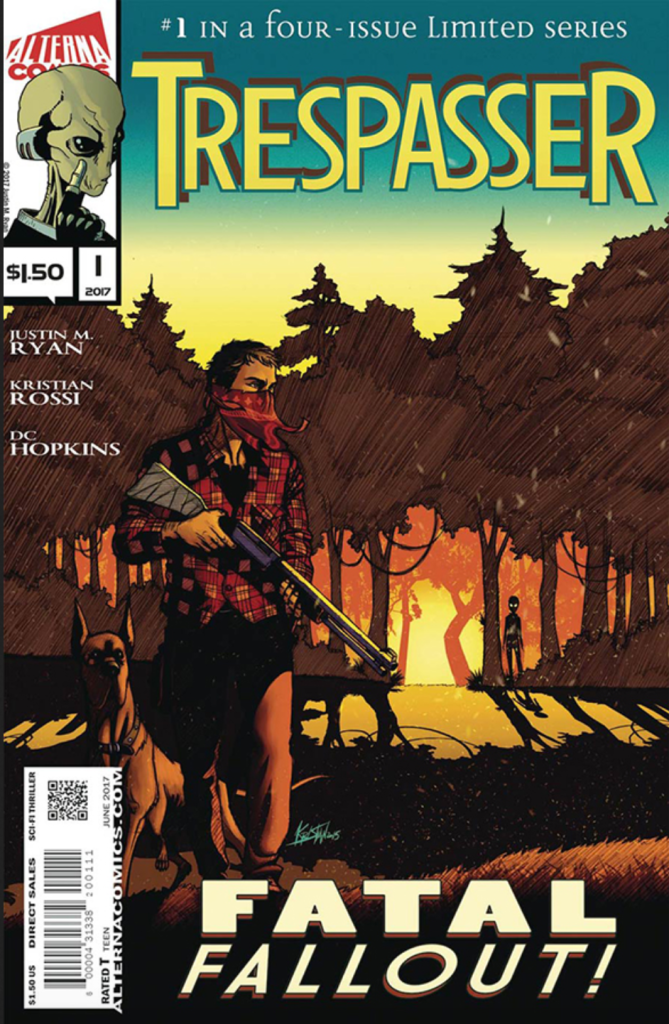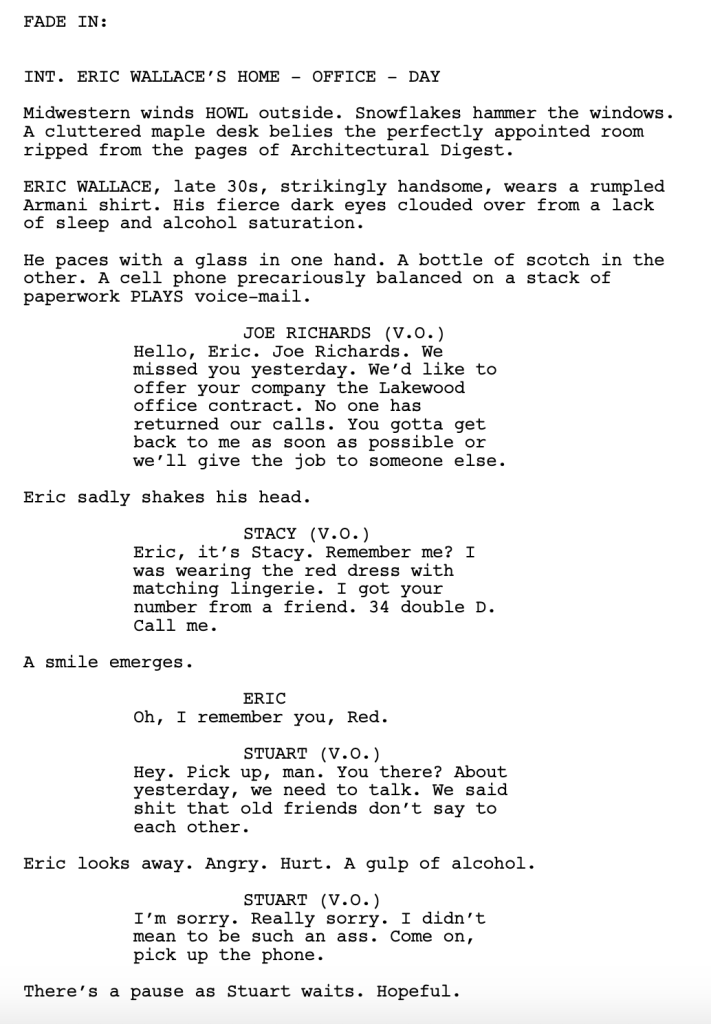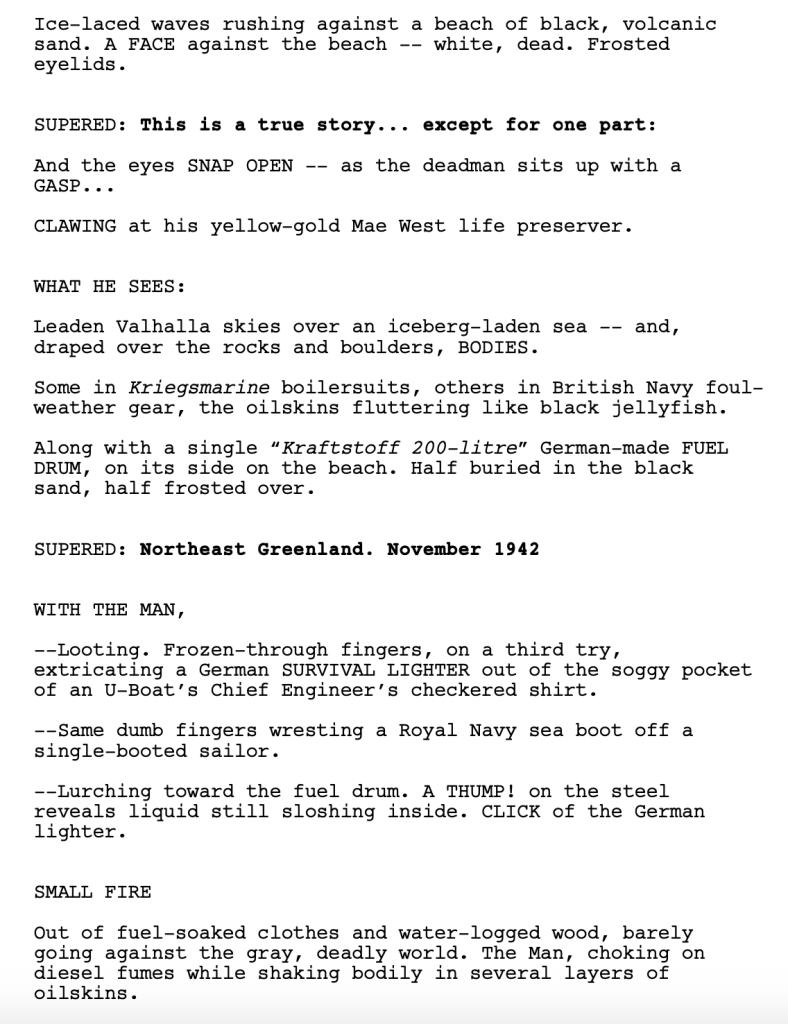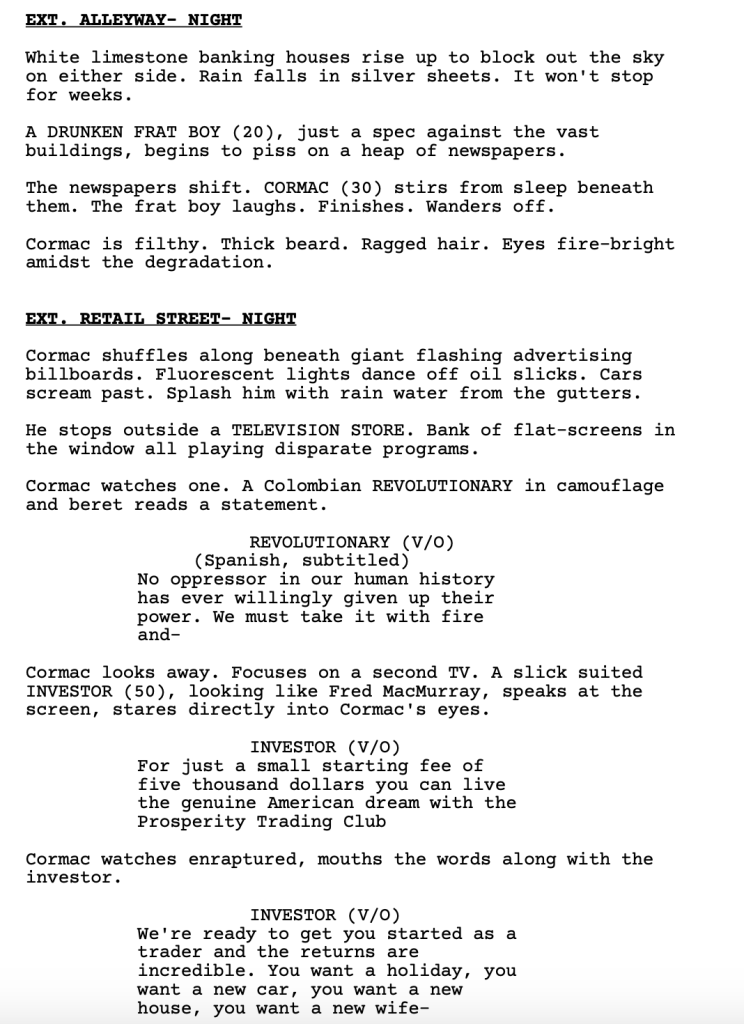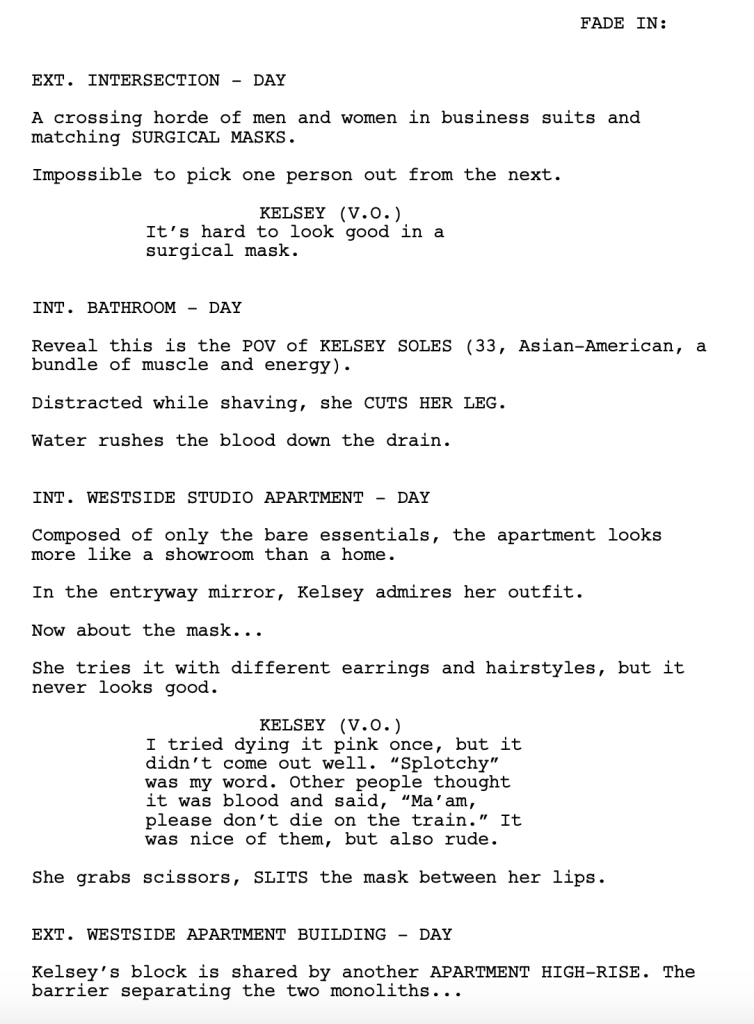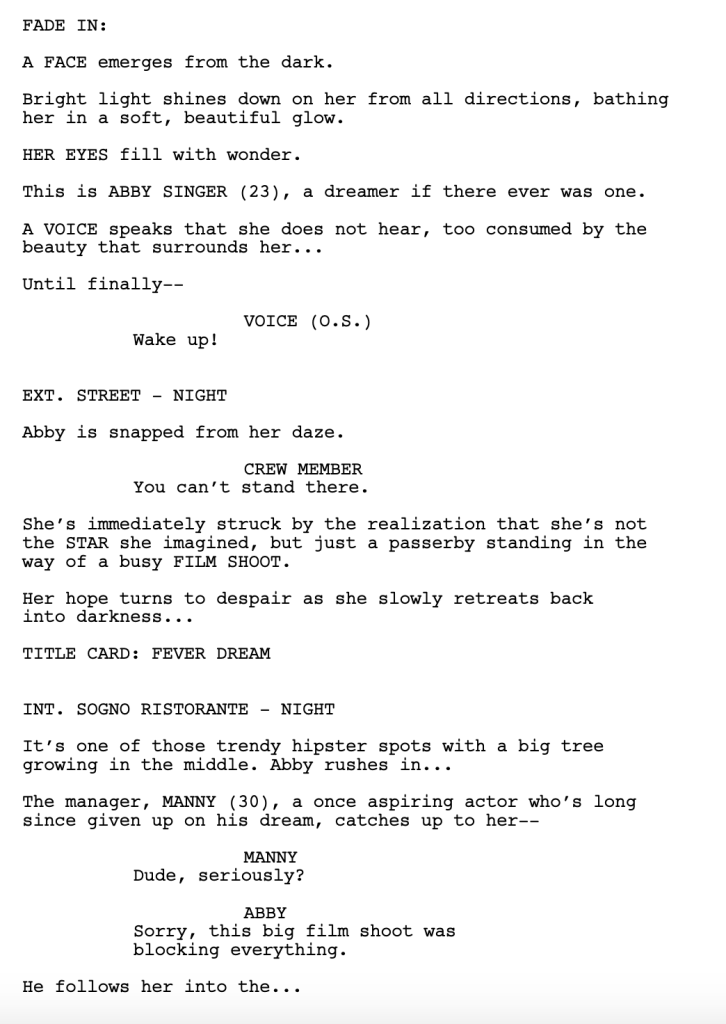Search Results for: the wall
Genre: Sci-Fi/Horror
Premise: A father and daughter living in remote isolation must fight for survival after aliens arrive seeking revenge for killing one of their own.
About: This one is based on a graphic novel. Jason Fuchs, who co-wrote Wonder Woman, joined up with Endeavor Content to secure the rights. The pitch here was “Another Quiet Place.” Goes to show that mentioning recent breakout movies as a comp goes a long way towards selling something. This script finished with 8 votes on last year’s Black List. Writer Gabe Hobson has not yet secured any writing credits, although he’s working on an HBO project with Alec Berg, who produces the great, “Barry,” for HBO. When is Barry coming back????
Writer: Gabe Hobson
Details: 107 pages
It’s a double dip of sci-fi ice cream this week.
The Gorge was fun. Can Trespasser surpass it???
We’re out in the middle of rural Alaska. I guess that’s a redundant sentence. All of Alaska is rural. But anyway, 40 year old Hector Ramos is teaching his 10 year old daughter, Maria, how to hunt. Quick aside here. I have read somewhere in the neighborhood of 500 “fathers teaching their offspring how to hunt” scenes in screenplays. I strongly advise against them for that reason.
Although I wasn’t thrilled about the hunty-teachy scene, it’s followed up with a pretty cool chase scene. Hector and Maria load the caribou they killed onto a basket trailing their snowmobile and a bunch of hungry wolves begin pursuing them to steal their kill. That was cool.
Once at home, Maria expresses interest in what’s “beyond the river” that she’s never able to cross and Hector is super sketchy with his answer. We get the feeling that he’s keeping a big secret from her. That night, after her dog goes missing, Maria heads out to look for him and finds a little 4 foot humanoid black creature caught in one of their bear traps.
She calls her dad out and he’s freaked out by the thing. Says to leave it there. But Maria is so intrigued, she comes back later and feeds the alien. It seems nice. The next day, when Hector learns his daughter went back out, he’s furious and kills the thing! That very same day, Maria spots another alien. And then another!
She runs back to the house and, by that time, five aliens are in pursuit! Lucky for her, these aliens are not up to date on breaking and entering procedure for Alaskan cabins as they get all confused by the walls and windows and such. That gives Maria enough time to stall for Hector to come back. The two will then have to defeat the creatures who are dead set on getting revenge for the murder of their alien brother!
For those who don’t know, there was a screenplay written forever ago that was Steven Spielberg’s original idea for E.T. It was based on a real story where a redneck family was [supposedly] terrorized by a group of little aliens who were trying to break into their house. I’m guessing this, at least, partly inspired Trespasser?
Hey, I don’t blame ya. You can do worse than Steven Spielberg’s scraps.
I was so underwhelmed by this script, though.
As I read it, I was trying to figure out why it wasn’t working. More specifically, I was trying to figure out why the movie, Alien, works but this doesn’t.
Both of them have nefarious aliens in them. Trespasser actually has more than one. In both cases, the characters are contained to a certain location and are being stalked by the alien. And yet, I wasn’t once invested in or worried about these characters. I bounced a number of ideas around in my head as to why, never coming up with a satisfactory answer.
I would argue that you should be even more invested in Trespasser’s protagonist than Alien because Trespasser’s protagonist is a 10 year old girl. Who isn’t rooting for a 10 year old girl to not get killed by evil aliens? If you’re one of the few, keep it to yourself you heartless bastards.
In the end, I think it comes down to something simple.
The creature itself.
The creature in Alien started off as this mysterious football-sized thing that attached itself to your face. There’s something scarier about an alien whose makeup we don’t yet understand. You’re not even sure what you’re looking at.
Then, of course, the alien grows inside the body, bursts out of the chest, and becomes an even more horrifying creature the larger it grows.
In Trespasser, you basically have five 4-foot tall black humanoids. I’m sure if I was the target of one of these things, I might be less brave than I’m claiming to be now. But something that’s small – in this case as small as a ten year old – I’m just not sure how fearful I can be in a movie setting. Especially because they’re humanoid and familiar. There’s no mystery to them.
This is something I tell writers quite a bit. When you’re creating a villain – whether that villain is a killer or a monster or an alien – you need to describe something to us that feels unfamiliar in some sense. Because the unknown is what’s scary. The more we know about something, the less scary it is. That’s why when I watched Alien for the first time and that face-hugger attached itself to one of the crew-members, I was trying to figure out what the hell was going on. That’s what was so scary about it.
Ditto The Thing. You didn’t know what you were dealing with there on that base. That’s a big reason why it was so terrifying.
It just seems kind of silly to have a bunch of little men chasing your hero around. I’m struggling to find the fear-factor in that. Especially when they don’t even know what to do when they encounter walls. How scary can something be when it sees a house and goes, “Un oh. Now we’re screwed.”
The one good thing this script had going for it was the mystery of why the father had dragged his daughter into the middle of nowhere to live. We kept getting these hints that he wasn’t telling her the whole truth. Maybe even lying completely about the reason they lived in the wild. That mystery was the only reason I wanted to turn the pages.
If there’s something to learn from this script, I’d tie it into my contemplative weekend I referred to in the Monday post. Go and scroll through the thumbnails of four streaming services for fifteen minutes. Look at the sheer number of options people have. Understand what you’re competing with. That way, when you think five little humanoids are a good idea for scary alien monsters, you might check yourself and consider another, more menacing, option.
[ ] What the hell did I just read?
[x] wasn’t for me
[ ] worth the read
[ ] impressive
[ ] genius
What I learned: Is your villain/monster/alien/demon actually MENACING. If they’re not menacing, we’re not going to be afraid of them. I didn’t know whether to run from these humanoid trespassers or pick them up and pet them.
What I learned 2: Add the 1,249,081st script to the “Dead Kid Backstory” pile. Just in case you were thinking it was a good idea to add a dead kid backstory to your next script.
Genre: Dark Comedy
Premise: (from Black List) After discovering his secret songwriting partner dead, a country music star struggling to record new material makes a Faustian bargain with a family of possums who have taken up residency within his walls.
About: This script finished with 16 votes on last year’s Black List. Screenwriter Isaac Adamson is no stranger to scripts about animals and humans, or the Black List for that matter. His script, Bubbles, a biopic about Michael Jackson told through the point of view of MJ’s chimpanzee, topped a former Black List. That project, which was moving full steam ahead, was halted suddenly due to one of the unflattering Michael Jackson documentaries that came out. So Adamson went back to one of the surest formulas for getting back on the Black List – mix humans and animals together in some weird way. Adamson also has a Chippendale’s biopic project set up with the director of I Tonya, Craig Gillespie.
Writer: Isaac Adamson
Details: 96 pages
Is there better catnip to the Black List than weird human-animal movies? Actually, human-to-animal transformation movies have been around long before The Black List. I remember when my dad took me to the old black and white version of The Fly. The words, ‘Help me, help me,’ still ring in my ears today.
There’s something about someone transforming into something else (in this case, an animal) you’re going to want to stick around to see. This is what good stories do, people. They come up with reasons for us to stick around. So when Eddie Vesco starts turning into a possum, I couldn’t help but wonder just how drastic the final transformation was going to be.
32 year old Eddie Vesco has it all. He’s a platinum selling country rock star with a model wife. Sure, she’s decided to become a “painter” in her post-modeling day, but you take the good with the bad, right?
Speaking of, Eddie’s in need of some good. It’s been forever since his last album and he’s already spent all the money he was advanced to record his next album. Which means it’s time for Eddie to get back to work. Eddie has a system for recording hit records. He’s got a cabin out in the middle of nowhere, complete with a recording studio. So he goes there, gets inspired, and comes back with 13 new songs.
But when Eddie shows up at the cabin, we immediately learn there’s more to the story. A beaten down 42 year old heroin addict named Otis is sitting in the corner of the living room, half-hidden in the shadows. You see, Eddie doesn’t know how to write songs. So this guy does it for him. Secretly of course. The whole reason it’s been so long since the last album is that Otis was in prison. He’s finally got out.
Eddie tosses him 5 grand and tells him to get to work. There’s only one problem. That night, Otis OD’s. Which means… you got it… Eddie, for the first time, has to write his own songs.
After Eddie throws Otis’s body in the woods, he notices that he has a possum problem. Possums are always coming in and out of the many holes in the walls. Eddie doesn’t realize just how bad his possum problem is, however, until one of the possums starts talking to him. In English.
Possum Jack explains that HE was the reason Otis could write those songs. And that he can do the same thing for Eddie. All Eddie has to do is bring food for him and his pregnant possum wife, Possum Jill. But when Eddie grabs some junk food from the local gas station, Possum Jack makes it clear that they need more nourishing food. Preferably, roadkill.
Eddie’s about had it with these pesky possums but after Possum Jack helps him record his first of thirteen songs and the song is amazing, Eddie’s willing to do whatever it takes to get the other 12. So he gets roadkill for the possums but they say the roadkill is too old. They need fresher meat. So Eddie gets a live cat from the animal shelter. But these picky possums want something better. Like, say, HUMAN meat.
During this time, poor Eddie starts growing big thick whiskers on his face. Possum Jack informs him that this is part of the deal and it will keep happening until their deal is over. Eddie asks if there’s any way to stop it. The only thing they’ve seen stave off the transformation is what Otis was doing. As in, heroin. Which means now Eddie will have to become a full-on heroin addict.
All of this comes to a head when Eddie’s manager and wife show up. But, by this point, Eddie is so far in it, so determined to get those 13 songs, that he can even rationalize sacrificing them. It’s at this point that we realize… maybe nobody survives these possums.
Let’s start with the structure here.
One of my rules is that if you’re going to write something wacky, you want the rest of your screenplay to be structured. This grounds your story. And Adamson did a good job here. He set up the parameters well. Goal – go record 13 songs. Stakes – if he fails he’ll owe the recording company the full advance they gave him, which he’s already spent. Urgency – he’s got two weeks.
In addition to this, the setting itself is contained (to this farm house). Which further structures the story. Every time you add a border or a time limit or anything that acts as a container around the story, the story is easier to tell. And it’s easier to follow as well. This just as easily could’ve been about some singer who spends a year doing a bunch of concerts and at night he has possums talking to him and they’re really funny and they won’t leave him alone and he records a great final record and… whatever else you wanted to throw in there.
I know that sounds ridiculous. Who would write that? you say. If you’re writing one of your first three screenplays, you’re probably writing stories just like that. They’re all over the place. Messy. Directionless. I know because I read them. So, yes, you do need to worry about structure when you write, especially with subject matter like this.
Where Possum Song loses its melody is in it world-building. And this is where a lot of writers get lost in the weeds if they’re not careful. Once you start developing your world and its rules (in this case, the possums and how they operate) you can become seduced by that world and expand it too far.
We have a guy who relies on another guy to write his songs. Who it turns out is relying on a magic possum to write those songs. And this possum only performs this magic act if you bring him food (possums can’t find their own food?). But processed food isn’t good enough. They need real meat. But then older meat isn’t good enough either. They need recent dead meat. And then recent dead meat isn’t good enough either. Now they need human meat? And part of the curse means you start turning into a possum. But you can stop your possum-turning by doing heroin?????
Sometimes, in the unlit shadows of a 3am writing session, you can talk yourself into these things. “Yeah, that all makes sense.” But when the harsh morning sun shines down, that’s when you have to be honest with yourself. Because writers can talk themselves into anything. So you need to have that ‘come to Jesus’ moment with yourself when dealing with rules, rules, and more rules.
Because the power of a script like this is in its simplicity. It’s a dude using possums to record songs. The more convoluted you make that, the quicker you’re going to run into trouble.
This wasn’t as good as Bubbles which had that “lightning in a bottle” effect going for it. And I would’ve liked to have seen more of a physical transformation in Eddie. I think people are coming to this movie for the Jeff Goldblum level “Fly” transformation. So that would’ve been more fun. But it’s still a good script. It’s an especially good script to read to understand what kind of zaniness the Black List responds to.
[ ] What the hell did I just read?
[ ] wasn’t for me
[x] worth the read
[ ] impressive
[ ] genius
What I learned: The time constraint before the time constraint. The time constraint of this screenplay is two weeks (that’s how long he has to record the songs). But that two weeks isn’t up until the end of the movie. So what you can do is you can create a more immediate time constraint somewhere in the middle of your script, which acts as a way to keep tension up in the second act. Here, Eddie’s wife, who’s pregnant, is having the sonogram on Wednesday, where they’re going to find out if it’s a boy or a girl. She really wants Eddie to be there, which he promises to be. This is the time constraint before the time constraint. It’s something we know we’re leading up to, and therefore one more way to add a little tension and direction to the script.
As the movie landscape continues to nosedive, my desperate search for something, anything, to watch continues. This weekend, I hit an all-time low. I found my finger painstakingly scrolling down the Netflix queue where it landed on “To All The Boys Always and Forever Part 3.” As the highlight box surrounded the film, I almost – ALMOST – pressed “okay.” Don’t worry, though. Cooler heads prevailed and I clicked away – far far away from any Boys Always Being Loved.
Luckily for me, I got one of those recommendations that happened to be something that had been recommended to me before. A movie on Hulu called “In and Of Itself.” Which is usually a sign that something is good – if two unrelated parties are suggesting it to you. Not gonna lie. It looked pretty weird. But desperate times call for desperate measures. So I restarted my Hulu subscription and off I went.
In and Of Itself mirrors what they did with Hamilton. A guy was doing a one-man show in New York that played for over 500 nights. The play then became so popular, that he taped one of the performances and sold it to Hulu.
The show/play/movie/performance/documentary immediately shows its hand, establishing that it’s not like anything you’ve seen before. The unassuming mild-mannered orator, whose name I don’t know, proceeds to tell us a story about a guy named the “Rouleteesta.”
The Rouleteesta was a gentleman so lost after having returned from war that he would do anything to feel alive again. So he entered a highly illegal underground game of Russian roulette. Yes, this was real Russian roulette. With an audience. And it was so popular that everyone would come in to bet big on the winners and losers.
Now, every contestant who played this game only played once. Because if you lost, you’re dead. And if you won, you got paid a handsome fortune. This game brought in a lot of desperate people who needed money. Once they got that money, they weren’t dancing with the devil a second time. Not so for the Rouleteesta. After winning that first night, he came back the very next night to play again. People thought he was crazy. And maybe he was. But that didn’t matter. After he won a second time, he came back a third.
And when people started to doubt him – assuming he figured out a way to cheat the system – he insisted that they put TWO bullets in the chamber instead of one. Let’s up the stakes, baby. And even with two bullets, when the Rouleteesta pulled the trigger, he was still alive to tell the tale.
I should inform you at this moment that our stage the orator is on has, behind it, on the wall, six windows, each of which holds a lit display. In the top left display is an artistic rendition of a rouleteesta puppet. And whenever we hear about another night of Russian roulette, the puppet mimics the motion of putting the gun to his head and, ‘click,’ surviving.
Back to the Rouleteesta. After the the two-bullet gimmick wore off, the fearless Rouleteesta says, fine, I’ll put three bullets in the chamber! At this point, he’s up to a 50/50 shot of blowing his brains out. But he’s the Rouleteesta! And despite several nights of holding a half-loaded gun to his head and pulling the trigger, the Rouleteesta continued to survive!
So he adds a fourth bullet. And then a fifth bullet! And after surviving night after night, he finally demands that they put a SIXTH BULLET in the gun. That would mean the gun was loaded! And so on that night, with everyone betting against the Rouleteesta, figuring even he couldn’t outsmart a loaded gun, you know what happened?
I’m not going to tell you.
You’ll have to watch the movie to find out.
Believe it or not, I’m not trying to anger you. Quite the opposite, actually. I’m trying to help you. You see, me stopping the story before I give you the ending was done to make my first point about storytelling today.
Which is what all of you screenwriters do, by the way. You tell a story. Every time you write a screenplay. Every time you write an act. Every time you write a scene. You’re telling a story with a beginning, a middle, and an end. And if, at any point, you were to stop telling that story, your reader should be furious with you. Just like you’re upset that I didn’t finish this story.
Think about it. If you’re writing a screenplay and, at any time, you could take the screenplay away from the reader, and they aren’t upset with you, you’ve failed. If they’re like, “Yeah, I’m fine whether I know what happened or not,” you’ve failed. You must design every story you tell in a manner that makes the reader furious should that story be taken away from them.
And I don’t think 95% of writers write that way. I think they write on their time, on their schedule, and never once consider how invested the reader is at any given moment.
In and Of Itself is fascinating in the respect that we are all this orator. We are all one person on a stage trying to keep an audience invested. We desperately need them to care. To want us to keep going. As such, it’s our job to use every trick in the book – everything we know about writing – to keep their interest. It doesn’t matter if it’s sophisticated or the cheapest trick in the book. If it works, it should be in the toolbox.
And our orator has many tricks up his sleeve. For example, he establishes these window displays behind him. Each of them has a different object in it that, until called upon, is a mystery to us. But starting with the Rouleteesta story and connecting that to the Rouleteesta puppet display, he now has us wondering, “Hmm, I wonder what those other displays mean.” And what’s the only way for us to find out? It’s to keep listening to the story.
You can do the same thing in screenwriting. In Star Wars, when we see the Death Star blow up Alderaan, Princess Leia’s home planet, and Mof Tarkin demands that Leia tell him where the Rebel Base is, that is a ‘window display’ screenwriting trick. You are saying to the reader, “This planet-destroying death star is going to try and blow up the Rebel Base.” You’re giving us a peek into the future, just like those displays give us a peek into the future. And, also, just like those displays, there’s still mystery attached. We don’t know if they’re going to succeed or fail.
Just for a second, imagine Star Wars without the Death Star demonstration scene. If we never see it blow up a planet, we never see the window display that tells us what’s coming. That doesn’t mean we wouldn’t think it was dangerous. But the window display trick gets us a lot more invested. And that’s the name of the game. The more invested the reader is, the more excited they are to turn the pages.
It turns out the orator is really good at giving you reasons to stick around, which is the secret sauce of any good story. You have to set up a situation by which people want to stick around. And so after the Rouleteesta story, the orator explains that one person from the audience, every show, must agree to come to the next night’s show. They will be in charge of the show’s “book,” which is sort of like a diary of every night’s performance. Unfortunately, that audience member is not allowed to see the end of the show. They will be required to leave, with the book, come back the next night, and only then will they get to see the ending.
The orator leans into this fact and explains to the book-taker that he’s going to LOVE the ending. There’s going to be an elephant. Like a real live elephant. Out here on this tiny stage. It’s what makes the show everything it is, he emphasizes, reiterating several times the craziness that’s going to happen at the end of the show. It’s life-changing.
Most people, when they hear this, don’t know what’s going on. They’re wrapped in the comedic back-and-forth between the orator and the audience member, who’s learning the rules of the book and what will be required of him going forward. But seasoned storytellers know exactly what’s happening. The orator is feeding our need to stick around – to be there when this big crazy thing happens. Everyone in that audience is now looking forward to the ending. Imagine having a reader that excited about the end of your story. You could probably write a 50 page dialogue scene in a diner before that ending and still have the reader excited to get to that final act.
In and Of Itself is one of those rare experiences for screenwriting fanatics like myself where we get to see the storytelling form from a different perspective and therefore notice things that we usually overlook. It’s a reminder that all we’re trying to do in a screenplay is tell a series of stories – through scenes, through sequences – that readers want to keep reading. And that there are numerous tricks you can use to get there. This movie was a great reminder of that.
Is Karma the next Matrix, the next Wanted, or the next Assassins Creed?
Genre: Action/Supernatural
Premise: After an aimless woman wakes up from a short coma, she begins exhibiting special abilities.
About: David Guggenheim is one of those writers who experienced the screenwriting dream. It’s one thing to sell a script. A lot of writers have done that. But to get a script made into a movie is a rare thing. When Guggenheim sold his first script, Safe House, it just happened to be exactly what Universal Studios was looking to make at the time. So they fast-tracked it, and 8 months after Guggenheim sold his screenplay, his film was being made. That’s insane. And the thing is, when you get a produced credit from one of the big studios, you’re set for the next decade at least. And probably for life. Because writers who get stuff made are highly coveted. People think if they’ve done it before, they can do it again. So you’re going to keep getting work. Guggeneheim would eventually parlay his success into the show, Designated Survivor. On this one, he’s partnering with super-producer, Simon Kinberg.
Writer: David Guggenheim
Details: 128 pages
It’s the first spec sale of the year!
And if it’s going to be the first, it’s gotta be big! Big concept. Big page count. Big rating on Scriptshadow, though? Let’s find out.
Rachel is a 30 year old grade-school teacher who’s sleepwalking through life. It’s not that she isn’t motivated. But she has no direction. Her one love – painting – is something she happens to be terrible at. Her younger sister thinks she’s dying of boredom and wants Rachel to move to Chicago with her.
Meanwhile, we get a look at some Indiana Jones motherf#$%#r running through caves and throwing ancient daggers at people. This is Boone. Boone is a force to be reckoned with, according to Aegis International, a private security company that has dedicated all its resources to capturing Boone, something it’s been unable to do.
But that’s about to change. One day Rachel gets blindsided by a car, then a few days later wakes up in the hospital just as the doctor is trying to decide what to do with her. Rachel makes a suggestion, citing, word for word, an operating procedure from a 1915 English medical journal. Huh? How did she know that?
But that’s not all Rachel knows. A couple of days later, in the elevator, she has a fluent conversation in Arabic. But Rachel doesn’t know Arabic. Freaked out, Rachel heads home, only to have Aegis CEO John Gartner burst into her apartment with a team of men. He explains that she needs to come with them now! A minute later, a car BARRELS THROUGH THE WALL. It’s Boone! Who starts shooting at Rachel. Chaos ensues and Rachel flees!
John finds Rachel later and explains to her that she’s special. And if she wants to find out how special, she’ll come with him. He flies her to Aegis in France, where they begin the training sessions! You’re a “past-lifer” he explains to her. Someone with the ability to recall your past lives. This means that any skill anyone in your past lives had, you can obtain. “How?” She asks.
“Follow me.”
Rachel is placed in the “womb,” which allows her to be guided through an advanced form of regression therapy. Here, she can go directly into her past lives. And with every life she experiences, she retains their skills. Magician, samurai warrior, pianist, chess prodigy, you name it. Get in my way and I’ll check-mate yo a$$. Most past-lifers can only access up to 15 of their past lives. But Rachel is special. She completes 15 in her first day!
A newly energized Rachel is now ready to take on her nemesis – Boone. Aegis locates Boone hiding in Germany. So off they go. Oh, but if you think you know what’s going on, think again. When Rachel finally comes face-to-face with Boone, he tells her that it’s all a lie. That he isn’t the enemy. John Gartner is! Hmmm, is Boone just trying to protect himself? Or is he telling the truth? I know one thing’s for sure. Ya better protect your queen, b#$%h.
CHESS CHAMPION!
Okay, so let’s talk about this idea because it’s uncanny that I’m reading this after yesterday’s post about the next Amateur Showdown genre. For those who didn’t catch it, the next showdown is for HIGH CONCEPT scripts. “Karma” is the DEFINITION of a high concept. Here, the writer takes an idea that was accessible to everyone – past lives – and sexes it up. What if you could access those post lives? What if you could access the abilities of the people who lived those lives? You would be… superhuman. And just like that, you’ve got a high concept.
A common through-line with high concept ideas is that, when you hear them, you wonder why you didn’t come up with the idea yourself. We’ve all read that news story about the person who wakes up from a coma and all of a sudden starts talking fluently in a language they don’t know. Why didn’t we ask how to turn that into a movie? Guggenheim did, and he’s reaping the benefits.
It’s also an example of how to come up with a high-powered movie ready version of an idea as opposed to a boring variation of that idea. Cloud Atlas was also about past lives. But instead of packaging it in a cool action format, it expanded it out into a three hour drama. Which of these ideas do you think an audience is more interested in?
So Guggenheim gets an A+ in that department.
But I have the same issue with this script that I do with a lot of Guggenheim’s scripts. The execution is too by-the-book. I understand that these Matrixy concepts need to go a certain way. But if I’m predicting things that are happening 60 pages ahead of time, that means you’re not taking any chances. Don’t get me wrong. It’s still fun. But there’s a difference between those summer movies you see once then never watch again and the ones that you keep coming back to. The ones you keep coming back to are the ones where the writers took chances.
The writers and scripts I’m most impressed by are the ones where I’m reading them and thinking, “I could never do that.” I mentioned The Misery Index yesterday, a semi-finalist in my contest. When I read the dialogue in that script, I knew that if you put me in a library with all the greatest writers of all time teaching me how to write for 50 straight years, I still could not be able to write dialogue like that.
Yet, in Karma, I feel like the top 30% of writers here on Scriptshadow could write it just as well as Guggenheim. I’ll give you an example. One of the major components of this screenplay is the past lives. So the writer has to come up with all of Rachel’s past lives she’s lived. Here’s a sampling of what we get… Feudal Japan, Renaissance Painter, World War 2 pilot, Shaolin Monk, a blacksmith, ancient Egypt, Sherpa on Mount Everest, pre-historic man.
In other words, past lives that you could’ve come up with after literally 30 minutes of research. There’s nothing unique here that another writer wouldn’t have come up with. I want to stress that because it’s important. Your job as a writer is to come up with things that the rest of the world and your competition (other writers) couldn’t come up with. Or else why do we need you? If you’re giving us what we already thought of, well, that’s lame. We, the audience, are supposed to be creatively inept compared to you.
So that bothered me.
But mark this one down on the list of why concept is king. Even with its weaknesses, it still works, because the concept is so fun.
[ ] What the hell did I just read?
[ ] wasn’t for me
[x] worth the read
[ ] impressive
[ ] genius
What I learned: Often times, high concept is about taking a cool ‘what if’ scenario and placing it inside a high octane genre. Writers get this wrong all the time, so pay attention. Past lives is not a high concept idea on its own. It’s just as capable of being low concept in the wrong hands. You could write a movie about a guy who discovers he had a past life as a sheep farmer and becomes inspired to leave the city and live a self-sustainable life in Wyoming. You’ve technically got yourself a past lives script. But is it a good idea? To get the sexier logline, take your ‘what if’ scenario and plug into a bigger flashier genre, like Karma did (supernatural action). Big flashy genres include action, thriller, sci-fi, and horror. Those genres always make the idea feel bigger.
Your nights have been lonely. Your days? A pastiche of whimsical memories fading into each other like snowflakes drifting down to their sad thawed demise. Am I talking about your life since Covid? Nope. I’m talking about your life since Amateur Showdown.
But that changes today because AMATEUR SHOWDOWN IS BACK!
Like an old friend you’ve lost touch with who calls and screams, “I’m in town for one weekend. Let’s get wild!” That’s what Amateur Showdown has done. “Oh, don’t you worry. We’re going to get wild, Amateur Showdown. We’re going to get wild in ways that aren’t allowed on television!” That’s because this Amateur Showdown is the craziest of them all.
Character Piece Showdown.
Uh-huh. You read that right. How much more juicy does it get than introspective character exploration? Not even The Daily Mail will touch this it’s so risque.
I’ve been on the phone all week talking with frustrated advertisers. “Carson,” the CEO of Coca-Cola, Jerod Moss, said to me. “How can I post ads on your site when you’re talking about character flaws, inner conflict, the Hero’s Journey for God’s sake, Carson. The Hero’s Journey! How do I spin that to board members!?”
Believe me, it hasn’t been easy. I nearly canceled. I can’t have this kind of controversy following me around. But unlike Rick, I do stick my neck out. And despite the rabid protests outside my place demanding I not mention “character” and “piece” in the same sentence or I will face consequences, I’m moving forward. And I hope that you move forward with me. Cause I can’t do this alone.
That reminds me. The next Amateur Showdown will be October 16th and it will be a HORROR SHOWDOWN. Yes. We’re going to drape ourselves in the color of blood and indulge our inner freak show, all in time for Halloween. And don’t forget, you can enter SHORT HORROR STORIES as well as Horror scripts. So, if you’re going to enter, send me a title, logline, genre, why we should read your script/story, and a PDF of the story/screenplay to carsonreeves3@gmail.com any time before Thursday, October 15th, 8pm Pacific Time.
Now on to today’s scripts. If you haven’t played Amateur Showdown before, this is how it’s done. I pick five screenplays that were submitted to me and then you, the readers of the site, read as much of each script as possible and vote for your favorite in the comments. The winner will receive a review the following Friday that could result in props from your peers, representation, a spot on one of the big end-of-the-year screenwriting lists, and in rare cases, a SALE!
One last thing. This was one of the harder Showdowns to choose contestants for. A lot of you took the term “character piece” very liberally. The generes for these scripts were all over the map. I had to make some tough decisions on if picks were right for the showdown, but if you didn’t get picked, it was probably because I didn’t consider your entry “character piece” enough.
Anyway, good luck to all!
Title: The Wallace Web
Genre: Drama
Logline: When Eric’s business partner confesses that Eric’s dad has been paying him to ruin their company, Eric enlists the help of his estranged brother to confront their overbearing father.
Why you should read: When I was 18, my first job was the receptionist at a property management company. One of my many responsibilities was to accept contractor bids, log them in, and make sure they went into the correct job basket. One day a contractor handed me his bid proposal and asked that I pull his son’s bid for the same construction job. I politely told him no. He came back the next day with flowers, trying to bribe me to take his son out of the running! Who does that? I lied and told him the bids were already collected. His nice demeanor turned angry in an instant. I always wondered what the story was behind that family. Family and business are always good drama. I’ve had feedback from readers including “best dialogue ever” and another one called it the next “Warrior”. Thanks for reading my submission. I’m grateful for all the comments and suggestions.
Title: Dog Sled Patrol
Genre: Thriller, Period drama
Logline: In 1942, the sole survivor of an u-boat-destroyed British arctic convoy is paired with a native Inuit hunter on a months-long journey across the frozen wasteland of Northern Greenland. Before reaching civilization, they must survive the unforgiving conditions, an outside threat lurking in the dark — and the fact that one of them is not the person he says he is.
Why you should read: It’s World War 2, and you and your partner are on a patrol in one of the coldest, remotest, most desolate parts of the world — months of travel from the nearest outpost, in the deadly cold of a polar night, with only your 13 dogs for company.
To survive on the ice riddled with deadly traps of open-water “leads”, with white-coated terrors stalking just out of the view of your fading headlamp and the constant threat of a submarine Nazi incursion looming behind the icebergs, every “day” of the endless night you put your life in your partner’s hands — and him in yours. You get to know the other man closer than your own brother or a lover. One night, in your tent… he starts speaking German in his sleep.
Title: Few Die Well
Genre: Thriller
Logline: After a homeless veteran murders a banker in self-defence, he impersonates the dead man in an effort to land his dream job and lift himself out of poverty.
Why you should read: I’ve always been fascinated by stories of conmen and imposters, individuals for whom every word is fraught with the risk of discovery. Few Die Well charts the consequences of one penniless outsider’s attempts to claw his way up to the top through an elaborate lie of his own. He enters a world of staggering wealth and savage violence as he finds himself drawn into the orbit of scheming grifters, crooked cops and ambitious politicians. Its inspirations are myriad, the film noirs of the 1940s and 50s, the gritty crime dramas of the 1970s and the recent spate of intelligent thrillers like Nightcrawler and Parasite. In writing this screenplay, I set out to craft a character piece that has GSU at its core, that moved at a rapid pace without sacrificing development and depth. It comes in at a slim 87 pages and it ends with a bang.
Title: Love Sick
Genre: Character Piece / Romance
Logline: A door-to-door saleswoman struggles to keep her new relationship with a young journalist alive when she is forced to medically quarantine.
Why you should read: You may have noticed there was a quarantine going on for a while a few months ago. That’s to say that this script is insanely topical. Probably almost too much so. But maybe, just maybe… it’s also exactly the type of script that needs to be read right now: An introspective look at what it means to be human when the world goes to shit around you.
Title: Fever Dream
Genre: Psychological Thriller
Logline: After being assaulted, a struggling actress with a traumatic past gives a riveting audition, landing the lead role in a film. But the more she delves into the dark mind of the character, the more her dream becomes a nightmare.
Why you should read: Let’s face it, you gotta be pretty crazy to try and have a career in this industry. Most of us spend all our time working for free just in the hopes of one day getting a job that actually pays us. Well, after writing and directing my first feature (which landed a distributor, had a theatrical release, and even sold to Showtime), I actually thought I was on my way. And then… crickets. As far as the industry was concerned, no one f-ing cared. It was back to staring at the blank page all over again, hoping this time things would somehow be different. That’s when I realized how crazy this whole thing is, and when the idea for my new film was born.
Fever Dream is a timely, taut thriller that grabs you by the throat and never lets go. It’s a wild cross between Black Swan and Mulholland Drive that forces you to question how far you’re willing to go to achieve your dream, and at what price, and has an ending that will leave you breathless and wanting to go back and experience it all over again. Thanks for giving it a shot!

